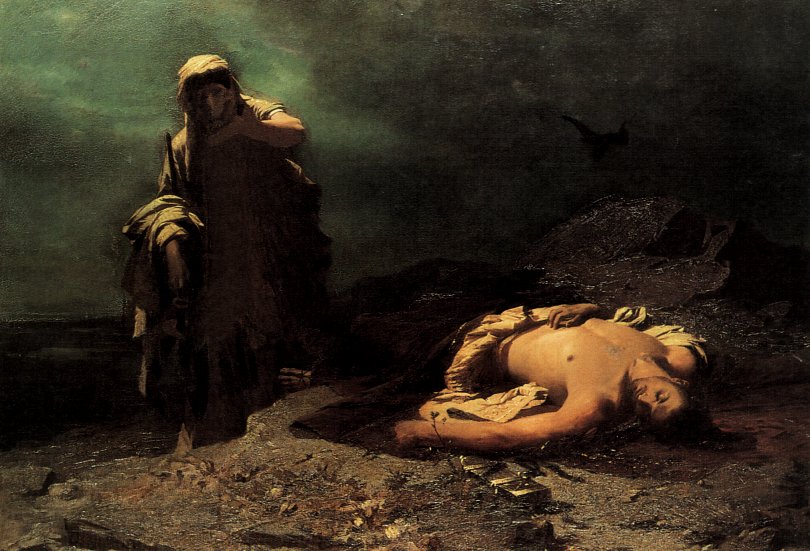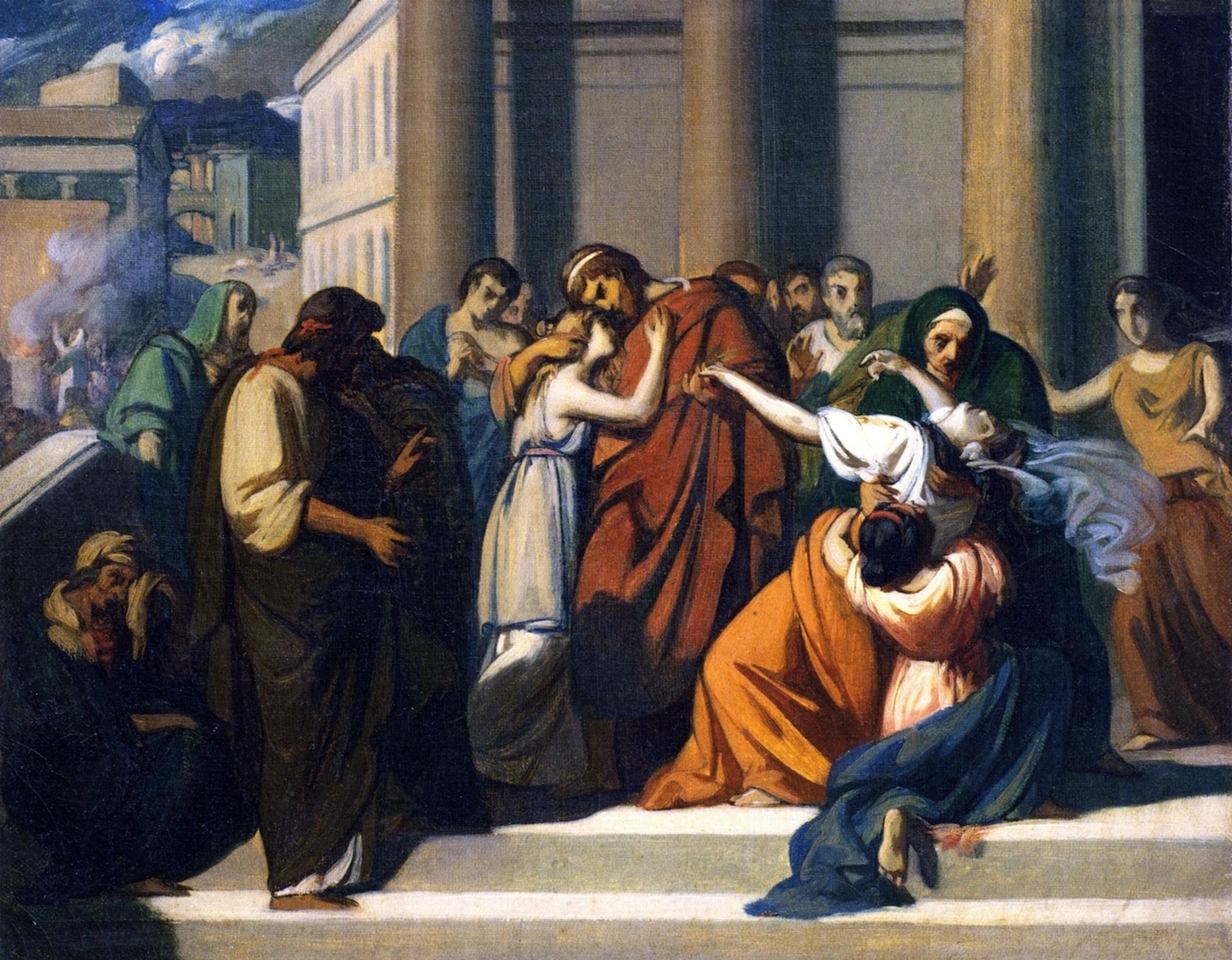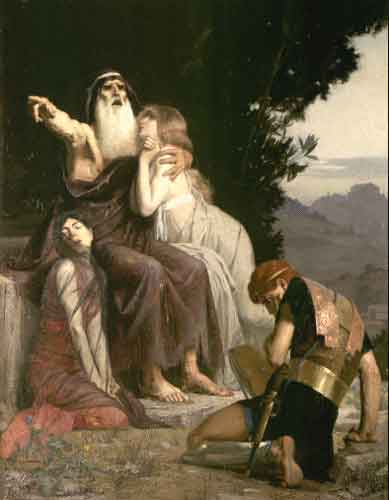|
Oedipus
Oedipus (, ; grc-gre, Οἰδίπους "swollen foot") was a mythical Greek king of Thebes. A tragic hero in Greek mythology, Oedipus accidentally fulfilled a prophecy that he would end up killing his father and marrying his mother, thereby bringing disaster to his city and family. The story of Oedipus is the subject of Sophocles' tragedy '' Oedipus Rex'', which is followed in the narrative sequence by ''Oedipus at Colonus'' and then ''Antigone''. Together, these plays make up Sophocles' three Theban plays. Oedipus represents two enduring themes of Greek myth and drama: the flawed nature of humanity and an individual's role in the course of destiny in a harsh universe. In the best-known version of the myth, Oedipus was born to King Laius and Queen Jocasta of Thebes. Laius wished to thwart the prophecy, so he sent a shepherd-servant to leave Oedipus to die on a mountainside. However, the shepherd took pity on the baby and passed him to another shepherd who gave Oedipus to ... [...More Info...] [...Related Items...] OR: [Wikipedia] [Google] [Baidu] |
Oedipus Rex
''Oedipus Rex'', also known by its Greek title, ''Oedipus Tyrannus'' ( grc, Οἰδίπους Τύραννος, ), or ''Oedipus the King'', is an Athenian tragedy by Sophocles that was first performed around 429 BC. Originally, to the ancient Greeks, the title was simply ''Oedipus'' (), as it is referred to by Aristotle in the ''Poetics''. It is thought to have been renamed ''Oedipus Tyrannus'' to distinguish it from ''Oedipus at Colonus'', a later play by Sophocles. In antiquity, the term "tyrant" referred to a ruler with no legitimate claim to rule, but it did not necessarily have a negative connotation. Of Sophocles' three Theban plays that have survived, and that deal with the story of Oedipus, ''Oedipus Rex'' was the second to be written, following ''Antigone'' by about a dozen years. However, in terms of the chronology of events described by the plays, it comes first, followed by ''Oedipus at Colonus'' and then ''Antigone''. Prior to the start of ''Oedipus Rex'', Oedipus ... [...More Info...] [...Related Items...] OR: [Wikipedia] [Google] [Baidu] |
Oedipus Complex
The Oedipus complex (also spelled Œdipus complex) is an idea in psychoanalytic theory. The complex is an ostensibly universal phase in the life of a young boy in which, to try to immediately satisfy basic desires, he unconsciously wishes to have sex with his mother and disdains his father for having sex and being satisfied before him. Sigmund Freud introduced the idea in ''The Interpretation of Dreams'' (1899), and coined the term in his paper ''A Special Type of Choice of Object made by Men'' (1910). Freud later developed the ideas of castration anxiety and penis envy to refer to the differences of the sexes in their experience of the complex, especially as their observations appear to become cautionary; an incest taboo results from these cautions. Subsequently, according to sexual difference, a ''positive'' Oedipus complex refers to a child's sexual desire for the opposite-sex parent and hatred for the same-sex parent, while a ''negative'' Oedipus complex refers to the desire ... [...More Info...] [...Related Items...] OR: [Wikipedia] [Google] [Baidu] |
Oedipus At Colonus
''Oedipus at Colonus'' (also ''Oedipus Coloneus''; grc, Οἰδίπους ἐπὶ Κολωνῷ, ''Oidipous epi Kolōnōi'') is the last of the three Theban plays of the Athenian tragedian Sophocles. It was written shortly before Sophocles's death in 406 BC and produced by his grandson (also called Sophocles) at the Festival of Dionysus in 401 BC. In the timeline of the plays, the events of ''Oedipus at Colonus'' occur after ''Oedipus Rex'' and before ''Antigone''; however, it was the last of Sophocles's three Theban plays to be written. The play describes the end of Oedipus's tragic life. Legends differ as to the site of Oedipus's death; Sophocles set the place at Colonus, a village near Athens and also Sophocles's own birthplace, where the blinded Oedipus has come with his daughters Antigone and Ismene as suppliants of the Erinyes and of Theseus, the king of Athens. Plot Led by Antigone, Oedipus enters the village of Colonus and sits down on a stone. They are approached b ... [...More Info...] [...Related Items...] OR: [Wikipedia] [Google] [Baidu] |
Three Theban Plays
Sophocles (; grc, wikt:Σοφοκλῆς, Σοφοκλῆς, , Sophoklễs; 497/6 – winter 406/5 BC)Sommerstein (2002), p. 41. is one of three classical Greece, ancient Greek tragedy, tragedians, at least one of whose plays has survived in full. His first plays were written later than, or contemporary with, those of Aeschylus; and earlier than, or contemporary with, those of Euripides. Sophocles wrote over 120 plays, but only seven have survived in a complete form: ''Ajax (play), Ajax'', ''Antigone (Sophocles play), Antigone'', ''Women of Trachis'', ''Oedipus Rex'', ''Electra (Sophocles play), Electra'', ''Philoctetes (Sophocles), Philoctetes'' and ''Oedipus at Colonus''. For almost fifty years, Sophocles was the most celebrated playwright in the dramatic competitions of the Polis, city-state of Classical Athens, Athens which took place during the religious festivals of the Lenaea and the City Dionysia, Dionysia. He competed in thirty competitions, won twenty-four, and was neve ... [...More Info...] [...Related Items...] OR: [Wikipedia] [Google] [Baidu] |
Sophocles
Sophocles (; grc, Σοφοκλῆς, , Sophoklễs; 497/6 – winter 406/5 BC)Sommerstein (2002), p. 41. is one of three ancient Greek tragedians, at least one of whose plays has survived in full. His first plays were written later than, or contemporary with, those of Aeschylus; and earlier than, or contemporary with, those of Euripides. Sophocles wrote over 120 plays, but only seven have survived in a complete form: ''Ajax'', ''Antigone'', ''Women of Trachis'', ''Oedipus Rex'', '' Electra'', '' Philoctetes'' and ''Oedipus at Colonus''. For almost fifty years, Sophocles was the most celebrated playwright in the dramatic competitions of the city-state of Athens which took place during the religious festivals of the Lenaea and the Dionysia. He competed in thirty competitions, won twenty-four, and was never judged lower than second place. Aeschylus won thirteen competitions, and was sometimes defeated by Sophocles; Euripides won four. The most famous tragedies of Sophocles feature ... [...More Info...] [...Related Items...] OR: [Wikipedia] [Google] [Baidu] |
Antigone
In Greek mythology, Antigone ( ; Ancient Greek: Ἀντιγόνη) is the daughter of Oedipus and either his mother Jocasta or, in another variation of the myth, Euryganeia. She is a sister of Polynices, Eteocles, and Ismene.Roman, L., & Roman, M. (2010). The meaning of the name is, as in the case of the masculine equivalent Antigonus, "worthy of one's parents" or "in place of one's parents". She appears in the three 5th century BC tragic plays written by Sophocles, known as the three Theban plays, and she is the main protagonist of the eponymous tragedy ''Antigone''. In Sophocles The story of Antigone was addressed by the fifth-century BC Greek playwright Sophocles in his Theban plays: ''Oedipus Rex'' Antigone and her sister Ismene are seen at the end of '' Oedipus Rex'' as Oedipus laments the "shame" and "sorrow" he is leaving his daughters to. He then begs Creon to watch over them, but in his grief reaches to take them with him as he is led away. Creon prevents hi ... [...More Info...] [...Related Items...] OR: [Wikipedia] [Google] [Baidu] |
Jocasta
In Greek mythology, Jocasta (), also rendered Iocaste ( grc, Ἰοκάστη ) and also known as Epicaste (; ), was a daughter of Menoeceus, a descendant of the Spartoi Echion, and queen consort of Thebes. She was the wife of first Laius, then of their son Oedipus, and both mother and grandmother of Antigone, Eteocles, Polynices and Ismene. She was also sister of Creon and mother-in-law of Haimon. Life After his abduction and rape of Chrysippus, Laius married Jocasta. Laius received an oracle from Delphi which told him that he must not have a child with his wife, or the child would kill him and marry her; in another version, recorded by Aeschylus, Laius is warned that he can only save the city if he dies childless. One night, Laius became drunk and fathered Oedipus with Jocasta. Jocasta handed the newborn infant over to Laius. Jocasta or Laius pierced and pinned the infant's ankles together. Laius instructed his chief shepherd, Menoetes (not to be confused with Menoetes ... [...More Info...] [...Related Items...] OR: [Wikipedia] [Google] [Baidu] |
Riddle Of The Sphinx
A sphinx ( , grc, σφίγξ , Boeotian: , plural sphinxes or sphinges) is a mythical creature with the head of a human, the body of a lion, and the wings of a falcon. In Greek tradition, the sphinx has the head of a woman, the haunches of a lion, and the wings of a bird. She is mythicized as treacherous and merciless, and will kill and eat those who cannot answer her riddle. This deadly version of a sphinx appears in the myth and drama of Oedipus. Unlike the Greek sphinx, which was a woman, the Egyptian sphinx is typically shown as a man (an androsphinx ( grc, ανδρόσφιγξ)). In addition, the Egyptian sphinx was viewed as benevolent but having a ferocious strength similar to the malevolent Greek version. Both were thought of as guardians and often flank the entrances to temples. In European decorative art, the sphinx enjoyed a major revival during the Renaissance. Later, the sphinx image, initially very similar to the original Ancient Egyptian concept, was exported ... [...More Info...] [...Related Items...] OR: [Wikipedia] [Google] [Baidu] |
Sphinx
A sphinx ( , grc, σφίγξ , Boeotian: , plural sphinxes or sphinges) is a mythical creature with the head of a human, the body of a lion, and the wings of a falcon. In Greek tradition, the sphinx has the head of a woman, the haunches of a lion, and the wings of a bird. She is mythicized as treacherous and merciless, and will kill and eat those who cannot answer her riddle. This deadly version of a sphinx appears in the myth and drama of Oedipus. Unlike the Greek sphinx, which was a woman, the Egyptian sphinx is typically shown as a man (an androsphinx ( grc, ανδρόσφιγξ)). In addition, the Egyptian sphinx was viewed as benevolent but having a ferocious strength similar to the malevolent Greek version. Both were thought of as guardians and often flank the entrances to temples. In European decorative art, the sphinx enjoyed a major revival during the Renaissance. Later, the sphinx image, initially very similar to the original Ancient Egyptian concept, was exported ... [...More Info...] [...Related Items...] OR: [Wikipedia] [Google] [Baidu] |
Ismene
In Greek mythology, Ismene (; grc, Ἰσμήνη, ''Ismēnē'') is the daughter and half-sister of Oedipus, daughter and granddaughter of Jocasta, and sister of Antigone, Eteocles, and Polynices. She appears in several plays of Sophocles: at the end of ''Oedipus Rex'', in ''Oedipus at Colonus'' and in ''Antigone''. She also appears at the end of Aeschylus' ''Seven Against Thebes''. In Sophocles Oedipus Rex Ismene is not named, but is seen at the end of Oedipus Rex as her father/brother laments the "shame" and "sorrow" he is leaving her and her sister to. Oedipus begs Creon to watch over them, but in his grief reaches to take them with him as he is led away. Creon prevents him from taking his daughters out of the city with him. Oedipus at Colonus Ismene appears in Oedipus at Colonus to tell her father of the situation in Thebes and the rivalry of his sons. She explains that Eteocles has taken the throne from Polynices and driven him out of the city. As a result of this, ... [...More Info...] [...Related Items...] OR: [Wikipedia] [Google] [Baidu] |
Polybus Of Corinth
Polybus (Ancient Greek: Πόλυβος) is a figure in Greek mythology. He was the king of Corinth whose wife was variously referred to as Periboea, Merope or Medusa, daughter of Orsilochus. Mythology Polybus reigned over the city like a gentle man and loved his wife, but unfortunately their marriage remained childless for many years. When Oedipus was abandoned as an infant by his parents Laius and Jocasta, the rulers of Thebes, Periboea, who was washing garments at the shore, found and rescued him. In other accounts, either shepherds or keepers of horses of Polybus found the small child in Mount Cithaeron and brought him to Periboea; in other versions, Laius' household slaves, who were unwilling to expose the child, gave him as a present to the wife of Polybus, since she could bear no children. With Polybus' consent, since they were childless, they adopted and raised him as their own son, and after his wife had healed the child's ankles, Periboea called him Oedipus, g ... [...More Info...] [...Related Items...] OR: [Wikipedia] [Google] [Baidu] |
Sigmund Freud
Sigmund Freud ( , ; born Sigismund Schlomo Freud; 6 May 1856 – 23 September 1939) was an Austrian neurologist and the founder of psychoanalysis, a clinical method for evaluating and treating psychopathology, pathologies explained as originating in conflicts in the Psyche (psychology), psyche, through dialogue between a patient and a psychoanalyst. Freud was born to Galician Jews, Galician Jewish parents in the Moravian town of Příbor, Freiberg, in the Austrian Empire. He qualified as a doctor of medicine in 1881 at the University of Vienna. Upon completing his habilitation in 1885, he was appointed a docent in neuropathology and became an affiliated professor in 1902. Freud lived and worked in Vienna, having set up his clinical practice there in 1886. In 1938, Freud left Austria to escape Nazi persecution. He died in exile in the United Kingdom in 1939. In founding psychoanalysis, Freud developed therapeutic techniques such as the use of free association (psychology), free a ... [...More Info...] [...Related Items...] OR: [Wikipedia] [Google] [Baidu] |







